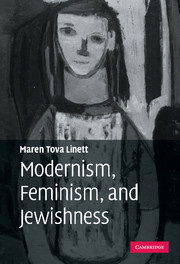Book contents
- Frontmatter
- Contents
- Acknowledgments
- List of abbreviations
- Introduction: imagined Jews and the shape of feminist modernism
- 1 “Strip each statement of its money motive”: Jews and the ideal of disinterested art in Warner, Rhys, and Woolf
- 2 Transformations of supersessionism in Woolf and Richardson
- 3 Adding bathrooms, fomenting revolutions: modernity and Jewishness in Woolf and Warner
- 4 The race must go on: gender, Jewishness, and racial continuity in Barnes and Richardson
- 5 The “No time region”: time, trauma, and Jewishness in Barnes and Rhys
- 6 Metatextual Jewishness: shaping feminist modernism
- Notes
- Works cited
- Index
2 - Transformations of supersessionism in Woolf and Richardson
Published online by Cambridge University Press: 22 September 2009
- Frontmatter
- Contents
- Acknowledgments
- List of abbreviations
- Introduction: imagined Jews and the shape of feminist modernism
- 1 “Strip each statement of its money motive”: Jews and the ideal of disinterested art in Warner, Rhys, and Woolf
- 2 Transformations of supersessionism in Woolf and Richardson
- 3 Adding bathrooms, fomenting revolutions: modernity and Jewishness in Woolf and Warner
- 4 The race must go on: gender, Jewishness, and racial continuity in Barnes and Richardson
- 5 The “No time region”: time, trauma, and Jewishness in Barnes and Rhys
- 6 Metatextual Jewishness: shaping feminist modernism
- Notes
- Works cited
- Index
Summary
Modernism for Virginia Woolf and Dorothy Richardson meant many of the things it meant for James Joyce: perhaps most importantly, experimental fictions designed to portray the interior rather than the exterior lives of their characters. But their literary projects were also feminist, and explicitly opposed to Joyce's egotistical “titanic failure,” as Richardson described it (W 68). They defined themselves against male literary traditions and set out to forge a feminist literary consciousness that would eschew egotism yet value and represent the experiences of particular minds. In this effort they drew on rhetoric of surpassing, improving upon, and superseding that enabled them to position their work as superior to prior and contemporary “masculine” writing.
In her foreword to Pilgrimage (1915–1967), for example, Richardson describes her dilemma as she set out to write a novel in 1911. The realist novel, represented, she says, by Honoré de Balzac and his “English follower” Arnold Bennett, was already being succeeded by a more highly articulated realism that valued literature insofar as it provided “mirrors of plain glass” rather than mirrors that were “rose-coloured and distorting.” Richardson set out to produce a “feminine equivalent” to this contemporary realism (P 9). To do this she had to discard “a considerable mass of manuscript” (P 10). As she began again, she became aware
of the gradual falling away of the preoccupations that for a while had dictated the briskly moving script, and of the substitution, for these inspiring preoccupations, of a stranger in the form of contemplated reality having for the first time in her experience its own say, and apparently justifying those who acclaim writing as the surest means of discovering the truth about one's own thoughts and beliefs.
(P 10)- Type
- Chapter
- Information
- Modernism, Feminism, and Jewishness , pp. 60 - 79Publisher: Cambridge University PressPrint publication year: 2007



